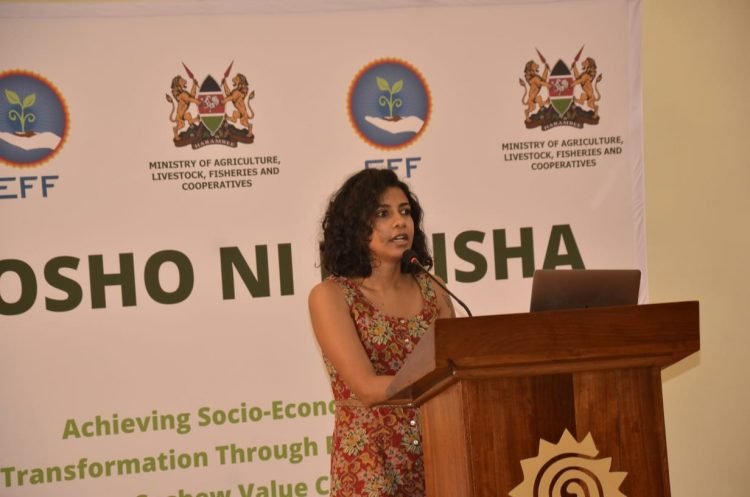By Murimi Gitari, 5 November 2020
Stakeholders in Kenya’s cashew industry have reached consensus on recommendations to revive the cashew value chain.
The resolutions were made at a two-day workshop in Mombasa drew participants from the national and county governments, the private sector, development partners, processors and farmers.
Organized by the Ministry of Agriculture, Livestock and Fisheries in partnership with Empowering Farmers Foundation (EFF), the workshop was officially opened by the Principal Secretary, State Department of Crops Development and Agricultural Research, Prof Hamadi Boga.
The deliberations aimed at identifying the challenges facing the cashew value chain and recommend measures to overcome them to revive the sector.

Among the challenges are lack of certified seeds for farmers, old age in orchards, very many gaps within the cashew value chain, obsolete expensive processing technology, and farmers and processors limited access to finance.
The recommendations to help revive the cashew value chain start from farmer to market pegged on Kenya’s Vision 2030 envisage the bare minimum of a six-member household transitioning from 1-10 trees to 60-200 trees.
Prof Boga said cashew, commonly called the “white gold” holds the promise for economic revival especially in the rural parts of the coastal region and could power an agro processing revolution.
“All cashew stakeholders can act together and resolve the systematic bottlenecks that have bogged down the sector by creating synergies with the farmers at the centre of the renaissance,” the PS said.
The ministry is reviewing an EFF partnership proposal to transform the livelihoods of coastal communities impacting over 300,000 smallholder farmers in the next seven years by activating the cashew value chain to increase production to over 200,000 metric tonnes annually.
“Through initiating a local agro-processing revolution, we anticipate to create 100,000 direct and indirect jobs along the value chain and generate over USD 300 million (Sh30 billion) in forex by the seventh year,” Prof Boga noted.
Representatives from Tanzania and Zambia who attended the workshop elaborated on how their countries have managed to revive and attain cashew value chain goals.
The presidents have been in the frontline, ensuring cashew farmers get all the necessary support from the government like acquisition of certified seedlings and inputs to boost cashew nut production.
In Zambia, farmers were facilitated in rehabilitating existing cashew plantations from 8,000 hectares to new cashew plantations on 43,000 hectares. Community nurseries of the white gold were established in high producing districts in the country.
Tanzania has set up processing factories in every district that produces cashews in high quantities. There is no limitation in exporting raw nuts but the country is investing in local processing plants and exporting processed cashew nuts.
The Cashew Board of Tanzania advises the government on cashew industry policies and strategies, helping to promote development of cashew production, processing and marketing. It regulates and controls the quality of cashew nuts, enforces regulations along the cashew value chain, issues licences and grants permits for buying and exporting cashew.
It was recommended that Kenya adopts a cashew revival strategy and invest more in research by supporting research institutions. Only a holistic approach and conscious awakening in the next three to seven years and partnerships with the right institutions would restore the sector to the old days of glory when cashew was considered a spiritual crop of the coastal region.
George Mazuri of Ustadi Foundation is calling for the integration of the youth and ICT into the cashew value chain to provide jobs that would see the youth embrace farming as an agribusiness. He said there is need for updated data on the cashew sector, noting that there are very different figures on cashew, with each providing a different story.
The EFF proposed the initiation of nurseries in Kilifi and Kwale counties to provide and distribute certified and high producing cashew varieties to farmers in the coastal belt and in Tharaka Nithi, Makueni and Embu counties to help farmers diversify and exploit the production potential.
“We need to have and set aside 100 acres of land to produce three million seedlings per year in three to seven years,” says EFF Chairman Mahesh Patel.

The government was requested to provide adequate resources to finance cashew projects and support the sector. The workshop urged county governments and political leaders to own and lobby for the crop’s recognition as a cash crop in Kenya.







